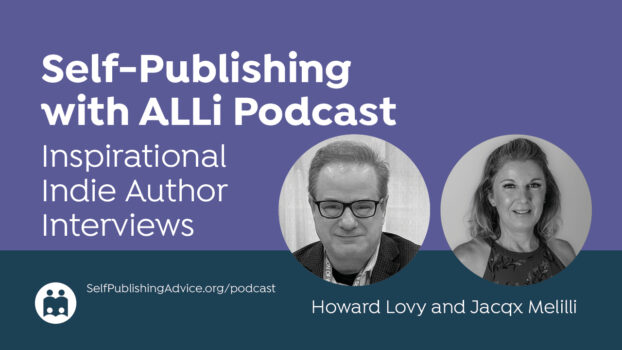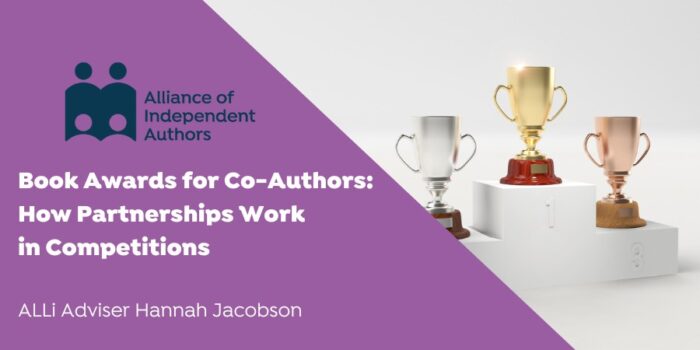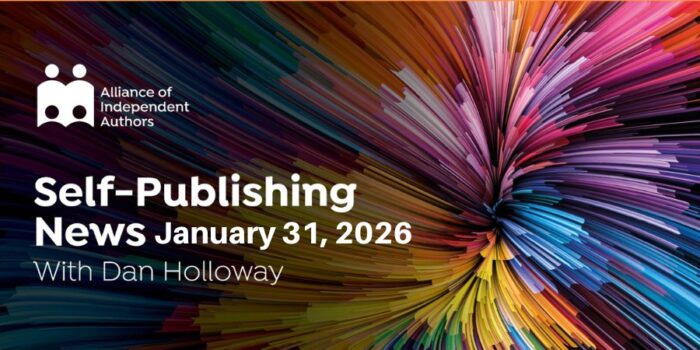The longer you're in an industry, the more knowledge and information you build. It's hard to remember those early days of no readers and single-sale days. But there's a huge number of debut authors publishing every day. ALLi experience shows that it can take up to seven years for an indie author to earn a living from their books. Author member Alastair Crombie has just launched his first book and explains what book marketing from a standing start is like in the current market.
 Book Marketing From a Standing Start – The Beginning
Book Marketing From a Standing Start – The Beginning
“I'm an author.” It's taken me a long time to work towards saying that sentence. I know most authors will recognize the feeling.
Over the five years I've been actively writing my debut, I've followed courses on writing, editing, publishing and marketing. I've had professional (and unfortunately not so professional but still eye wateringly expensive) edits and I've made most of the mistakes it's possible to make and a few that take a special kind of moron.
In April 2019, I felt my book was where I wanted it to be. Could it be better? Probably. But I was also at a point where if I didn’t publish soon, I might not publish at all. So, I decided I was ready. First mistake? Maybe, but not one I regret and I've learnt an incredible amount by just publishing my first book.
There are a dozen different gurus out there who do it much better than I. But I will say, if you’re looking for a starting point, try David Gaughran, Joanna Penn or Harry Bingham (or even better, try all three). But I'd done everything that was expected of me prior to launch.
- I'd a professional book cover that I’m very proud of.
- My website was up, plain but functional.
- I'd written a 15,000 word reader-magnet related to my debut novel. It proclaimed in big and bold words on my website and in my ebook that this was free and exclusive for my readers club.
- My email capture was running smoothly and I had been lucky enough to get a few tips from a very experienced indie guru.
Having done what I could, I launched.
The Middle
Twenty-seventh of April 2019, a red-letter day of dimensions. Yet my overwhelming feeling of that day will always be … underwhelming. My plan was to get on Amazon and then target readers using a number of promo sites for a four-day free book period. So that's what I did.
I was thrown a bit (in a good way) by getting a glowing five-star review by someone, who I swear was not my mother, within a few hours of launch! I don’t know what all the fuss is about, I thought. This indie lark is easy. My mum, like all my friends and family didn’t know I had published. I was listening when David Gaughran talked about the importance of family – with varied genre tastes – not polluting my also-boughts.
I went to bed reasonably happy. Sure, only one person had bought my book, but I hadn’t told a soul it was out and someone had still found it and thought it was pretty good. Amazon works. I was expecting to wake-up to a fat email list and sales galore. Obviously not. The next morning I cleared the tumbleweed from my sales numbers. Never mind I told myself, my promo plan has been tried and tested by thousands of authors before me. I had it set up for the next week, be patient and all will be well.
I have no numbers to compare my results too, so I really only have my feelings to go off and my feeling is that the 2,500 downloads for my free four-day period isn’t a great number. It certainly didn’t convert to anything I can use. My readers club is at a hugely embarrassing thirty-eight people. Amazon reviews are like leprechauns, incredibly rare and equally fickle. And since launch six-weeks ago, sales have not yet hit enough for a celebratory bottle of, well, anything.
The End
I set about an accidental investigation. There were two obvious possibilities: all those marketing gurus are wrong or I can’t write and should seek other employment opportunities. The second half of that answer first. Do I suck? I think I have enough talent to make a living from this, I need to hone my craft and learn, learn, learn. I’m under no illusions of being great but I don’t think I actually suck.
I think the answer, like the equator, is somewhere in the middle. Now, I'm not suggesting that the tried and tested marketing methods are somehow wrong. But I am suggesting they are skewed. The methods work if your platform is solid. If, like me, your platform has training wheels, the methods are unreliable.
Over the past few years the self-publishing marketplace has moved with race-track speeds. What was valid only three years ago is not equally so now. Especially for those new to the market. It is at this point the standard advice begins to crack. Launch is one thing if you have thousands, or even hundreds on your email list, if you have any kind of back-catalogue. You can follow the indie-author playbook and expect a certain level of sales.
But the standard plan of action doesn’t work for a newbie. An email list is a powerful tool, if you have one. Before launch mine was in single figures, and they were all family. I had a Facebook presence with fifty friends. No Twitter, or any other social media. That’s not exactly the Cape Canaveral of launch platforms. Starting cold is hard.
Why didn’t I do something about it? Go blog crazy, tweet like a canary, get friendly on Facebook? All of them valid points. They would require a long time frame, years rather than months to build a solid, reliable base. There are literally tens of thousands of author blogs out there. Twitter followers are notoriously bad conversions and Facebook, well…
My mistakes up to this point are myriad but a lot of them have meant little in the grand scheme of things. There are a number of details I could have changed or improved but they would have had little effect on my results. Put simply there are a few basics principles without which all else is noise.
The Basics For Book Marketing From a Standing Start
-
What does success mean to you?
I hadn't answered this question sufficiently. My definition of success was simple: to make a living as an indie author. Not an unreasonable goal I thought, and from all I've read, perfectly possible. But I didn't give myself a timeframe. While I didn’t expect to be rolling in Amazonian dollars immediately, I did think I would be able to extrapolate my debut to indicate if my goal was possible.
Hindsight is brutal but educational. Hope of immediate success from my debut that would give me the freedom to say ‘I’m a self-sustaining indie author’ was possibly naive. An expectation that six weeks, would be enough time for me to make such claims more so.
-
What are your expectations?
I realize now they were fuzzy. I didn’t really have expectations because I didn’t know what to expect.
I think there is a simple reason for that: There isn’t much written about expectations. Most of the experienced authors writing about indie marketing know that realistic sales numbers are not inspiring for newbies (and if I’m being cynical, will therefore sell less of their services). I think also it’s because they don’t know what realistic expectations are either, because of the speed with which things change.
-
Know your genre.
I honestly thought I did. But in the age of Amazon and the niche, knowing the top authors and their series is not enough. Are you a crime writer or are you a mystery, thriller, suspense -> crime fiction -> serial killers writer? Knowing the difference is what splits success from failure.
-
Identify your reader.
Mine was a thirty-something woman who reads YA, cares more about character but still wants action and likes a touch of romance. I thought that definition was good enough. It’s not, if you don’t know the name of your ideal reader’s pets you’re not there yet. And the reason for this is fundamental to all things indie.
It doesn’t matter how well researched your keywords and categories are. Your degree in Amazon ads is useless if you don’t have rock solid answers to the basic questions. If you can’t help Amazon find that first 200 sales, it will not help you with the next 200,000.
Why? The one-paragraph version is to do with granularity. Amazon awards authors who are niche driven. If you can help identify the exact type of reader who will buy your book and show Amazon you've done this, then it will put your book in front of every single similar reader on Amazon. If you can’t, it won’t. That's the essence of what sells books.
Unfortunately, I've not found any other methods that work reliably for newbies. I’m not sure there are any. The cold truth of the matter is that instant success belongs in the fiction we write and not in the facts we live.
Which leaves me where I started. Hard work and grind are the only things that offer reliable results.
I am genuinely considering starting again. Leaving, at least for now, the series that has been in my head for almost twenty years and going at something new. Applying all my hard won knowledge to try and avoid the holes I fell in this time. It’s a daunting thought, but if I wish to make a living as an indie, I think it’s the path I must take.
And the final lesson I learnt: living with disappointment. I know most authors recognize the feeling.
Author member @CrombieAlastair has just launched his first book and explains what it's like to start marketing from a standing start. Share on X
OVER TO YOU
What were or are your experiences when you started marketing as new indie author? Did you find particular tactics worked better than others? How long did it take you to build your list, for example?
If you enjoyed this post, you might like these from the ALLi archive:
https://selfpublishingadvice.org/beginners-guide-to-indie-author-jargon-book-marketing-glossary/





Dear Alistair,
You say: “Identify your reader. Mine was a thirty-something woman who reads YA, cares more about character but still wants action and likes a touch of romance. I thought that definition was good enough. It’s not, if you don’t know the name of your ideal reader’s pets you’re not there yet.”
Good enough. How the hell do I DO that!? I have done extensive research in all of the databases I can find, and this is as far as I’ve gotten.
My reader is a woman over age 30, highly educated (my population has nine times more advanced degrees than population average), is a power reader (more than 4 books per month) and has above average income. These ladies are either married with kids or divorced with kids. They have sophisticated tastes in fashion, home decor, and entertainment. They support the local symphony and binge-watch Downton Abby. They use TV, Pinterest, YouTube, and Facebook in that order of preference (no other media even rates 4% with this crowd – at least I’m relieved of the necessity of using Twitter!) I call my ideal reader avatar Janet; a 55-year old semi-retired pharmacist with a dog, a husband, two grown kids, a subscription to the local symphony, and an old-house restoration project.
I don’t know her pet’s name. I have no way of finding that out. Personal shopping patterns/demographic databases are available commercially – for hundreds of thousands of dollars. So, that’s out. Exactly where do I extract any further data? How can I define my readership more closely when I have a whopping two dozen sales? I can’t capture that reader information, I have no way of knowing who the purchasers were. I CAN’T FIND THAT INFORMATION!
Even worse, I would have NO idea what to do with it even if I had it! In what way do exact reader demographic/psychographic details change or inform my marketing? HOW? Would it change the art that I use? Would it change the channels I use? Would it change the blurb or ad copy? Would it change my author platform? What would happen if I knew every detail of “Janet’s” existence? How could I POSSIBLY use that information in any practical way?
I know there are marketing geniuses out there who can manipulate statistical data with ease and ferret out best practices from psychographic data, but I am NOT in their number! Even if, by magic, I could ferret out every detail of “Janet’s” life, how would that help? Your assertion seems reasonable on the face of it, but offers exactly ZERO practical actionable advice!
Hi Linda, I think Alistair was making a point about going deeper, rather than literally meaning you need to know the pet’s name. 🙂 Your analysis of your reader shows that you have done that deeper work. As to how you use it, this post has more practical advice and lots of case studies: https://selfpublishingadvice.org/finding-the-right-readers-for-your-book/
Waiting for bloggers to read my book and post a review is tiring. I used https://usbookreviews.com to gather reviews for my book and I am happy with the increase in reviews, sales and visibility.
Hi, Alastair,
I found your blog post very interesting. As a book-cover designer, I feel your experience close to heart and profession. Of course, we always cheer authors to get published, but that is only the beginning of a long marketing journey. As some have already said, having a big mailing list or a well established fan-base, helps a lot with the sales.
There is, however, another interesting route that might help. Have you ever thought of being a Speaker? If it interests you, it’s a very good way of talking to huge crowds, getting paid for speaking, whilst also providing an opening to sell your book. Even if it’s just speaking at an event as a volunteer, sharing some of your book’s contents or of interesting insights as an author, can help sell the book.
Wish you the best in this journey. There are no magic formulas, but just some hints towards selling a book. In the end, it’s always a bet, so the important thing is to enjoy the ride, whilst also applying the strategies that have worked for others.
Hi Alastair,
Well done on publishing and launching your book and thanks for sharing your experience.
You are so right and as others have said your experience is similar to so many other authors.
I think you should give yourself a timeframe for making a living as an author and then I think you can work out how you can get there.
Do think long term and not short term and do keep going. Think about your reader and how you can find them. Can you start by building more of a local presence? Can you find some other similar authors to club together and build a joint platform?
Tim Grahl has some great posts about thinking past the launch to long term – another guru, but his approach is a much more realistic one for first time authors.
Hi Kate, thanks for the heads up I shall take a look at Tim Grahl.
Thanks, Alistair. You’re succinct in your appraisal.
I’ve had all of this happen to me over 6 years. I’ve written since 2008. Such situations trap you in a dark hole, Questions arise, what to do next? Total failures are a normal consequence of life’s no matter how diligent or talented you are. None of us happy to accept, with our aspirations and ambitions. I have tried sensible strategies especially as my individual book count has reached 33.
I still have no idea why I can not move forward. My email list is stagnant, I have had thousands of downloads of my reader magnets for my four series. We are but leaves in the wind, an incidental vortex might just drop us on the sweet spot.
Despite all our efforts to be prepared, well organised and produce the best books we can, nothing is guaranteed, success is comparatively rare. I have a raft of friends who have given up the ghost! I have not, but a sugar daddy to pay for costly advertising would help tremendously.
There’s a tendency to be over optimistic in the entertainment industry which causes massive deflation and depression when reality surfaces. Best to enjoy what you do and persist if you have the mettle.
Alastair, Thanks for posting. You are helping new authors much more than you know. All who dream of being a full-time, self-supporting author need to hear such cautions and suggestions. My first book, Sabbatical of the Mind: The Journey from Anxiety to Peace did better than I could have expected out of the shoot. Even so, I felt horribly disappointed that sales faded after a few months. Not until my fourth book, Taking God to Work: The Keys to Ultimate Success, did I launch to significant sales and continue doing well. As a Christian author, I am already in a smaller genre. Then, I have had trouble deciding between fiction and non-fiction. Until I settle into a single niche and target that audience consistently, there is little hope of legit bestseller results. It does get better. I just launched a fifth book and my sales are better than ever for all my books. Keep writing, as long as you have something to say.
David, it’s nice to hear perseverance is rewarded. I am glad that things keep improving for you. It gives me hope.
I loved this, and yes, you CAN write, Alastair! 🙂 I’m about to follow in your footsteps and launch the first of my four-book epic medieval fantasy series, The Drinnglennin Chronicles, this fall. All books will be ready to go by then, so I plan a rapid-release of the subsequent titles. You’ve given some very good advice—including some affirmation of my pursuits on twitter and FB. Much appreciated and I wish you all the best!
Kristan, thank you for your comments. I’m impressed you have managed to write the whole series before publishing. I think that is probably a good idea I’m just not sure I’d have the patience. Good Luck and let us know how you get on I’d be very interested in hearing how it goes.
Alastair, reading your description of joy and disappointment took me back to my first books as well. I wish I could send you a bowl of soup that is comforting and give you a big hug. So, please consider this to be my virtual soup and hug.
Let me say that your experience is VERY MUCH the norm for new indie authors. Whether that is ten years ago or now. When I launched my first indie book, I was ecstatic because in the first year it made more than three times what my small press trad book had made. My small press trad book had yielded me approximately $300 for the year (of course realizing I was only getting 25% on ebooks and 6% on print it’s not apples to apples income comparison). My indie book yielded me just under $1,000. HOWEVER, when it first launched, all by its lonesome in a genre different from my trad book, it made a whopping $10 in the first month (that was 2011). The second month was nothing. The third month was almost $5. You get the picture.
What made the difference was that I released a second book in the series at the sixth month and a third book in the tenth month. The first six months were mostly single digits. When the second book launched it was double digits with a few $100 months between the two books. When the third book launched is when the sales were consistently better. In my experience, even now eight years later it is the same thing–though the start of a new series isn’t quite as bad now that I have 20 books behind me and a mailing list of 8K. But still…I started a new series, in a new genre for me, this year with a launch in May. May yielded $75. June is looking better at maybe (fingers crossed) $200-$250. I’m working on the next book and have put it on pre-order to signal to fans it really is coming. I don’t expect a lot of pre-orders, but I do expect when it is released that I can capitalize on sales of the first book and start counting read-through to the second one.
What I’m trying to say is IF you love the book you wrote and the world and characters you created, AND you have a series in mind, you should go for it. Series are what sell and abandoning your quest because this one book isn’t selling is not giving you, your book, or your series a chance. Even New York books with trad publishers don’t burn up the charts when its a debut unless the author is already a celebrity of some type.
Also, the niche you’ve described is right on. I have a YA Contemporary Fantasy / Urban Fantasy trilogy and more than 70% of my fans are NOT teens. They are women aged 35-55. 🙂 The one suggestion I would make is that currently the three categories you’ve listed for genre are all virtually the same. To make sure your book is being seen by the niche you’ve described you should also add a non-YA genre like fantasy and see if that at least starts showing it elsewhere.
It is true that it’s harder now to come out of the gate and hit the zeitgeist. With close to a million new indie books being released every year, the competition and discoverability is mind-boggling.
Maggie, thanks for the soup. And your comments, it is really helpful to get experienced feedback. I will definitely continue with the series i’m just not sure if I am going to do something else first. I know it’s daft but the disappointment from poor sales has kind of leaked into my current feelings for the series so I’ve been playing around with something else for a little bit.
I am starting to get over it though and have been thinking about book number 2 for the past few days. I think what scares me the most about the whole indie author thing is the speed I need to produce at. It has taken me years to produce the first one, and now I should write number 2 in mere months (and preferably weeks). I find the prospect very daunting. I am sure that is a common issue, I just have to get on with it.